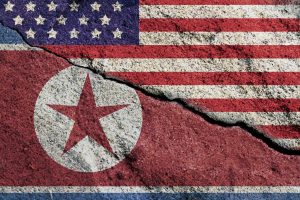President Joe Biden is planning a full review of U.S. policy toward North Korea. However, unless his team abandons bilateralism and the insistence on “inspections first, negotiations later,” his new approach is unlikely to break the nuclear stalemate with Pyongyang.
The diplomatic impasse continues because the two sides cannot find a way to trust each other.
Negotiating a nuclear deal between North Korea and the United States is challenging since both sides face strong incentives to cheat. When negotiating, Washington hopes to see Pyongyang cooperate by disarming, at which point it will be tempted to make new demands. Pyongyang prefers to reap the benefits of cooperation with Washington, while making sure its deterrent stays in place as insurance. As a result, neither can credibly commit to uphold the terms of any agreement.
Both states take a risk by cooperating as neither could retaliate against the other in case of defection. North Korea pursues nuclear capabilities, because it is unable to deter an attack by conventional means. Denuclearizing will leave it defenseless against the whims of a powerful adversary. On its part, the United States may find it too costly to penalize North Korea if it secretly maintains a functional nuclear arsenal. It follows that these two parties are unlikely to reach an agreement between themselves and even less likely to sustain it over time.
This problem of mutual distrust is made worse by the uncertainty of future intentions. North Korea remains concerned that U.S. promises only hold until its leadership changes, or has a change of heart. Such suspicions grew after witnessing the fate of Muammar Gaddafi, who trusted Washington enough to give up Libya’s nuclear program with tragic consequences. They were confirmed when President Donald Trump unilaterally exited the Iran Deal. This last move solidified Kim Jong Un’s resolve to maintain a nuclear arsenal under any circumstances to hedge for an uncertain future.
Firm pre-conditions make it even more difficult to reach an agreement with North Korea. There are no signs that Kim Jong Un might capitulate to U.S. demands. He will insist on receiving security guarantees before making any meaningful moves toward reducing his nuclear arsenal. In the meantime, North Korea’s nuclear program continues to advance. South Korea’s 2020 Defense White Paper revealed that over the past two years North Korea has significantly expanded its missile capabilities and improved the technology for miniaturization of nuclear warheads. Kim declared his ambition to further expand North Korea’s nuclear arsenal in a speech at the Eighth Party Congress of the Korean Workers’ Party just days before Biden’s inauguration earlier this year.
The only hope to restrain North Korea’s nuclear development is through a reversal of American policy. Biden would have to revive multilateral talks, ease sanctions, and commit to concessions to negotiate a mutually acceptable deal.
This approach has been attempted before. The Six Party Talks between China, Japan, North Korea, Russia, South Korea and the United States broke down in 2009 having achieved very little. At the time, however, the deal was multilateral only in name, with essential negotiations held separately between representatives of the two main adversaries. The remaining parties played witness, but failed in the one essential task that could have made a difference: enhancing the credibility of mutual promises.
A lot has changed since then.
There are two main reasons why the timing is perfect for crafting a new functional deal.
First, Pyongyang appears more willing to cooperate. The country is in deep economic trouble. Kim’s unprecedented recognition that North Korea has failed to fulfill its latest economic plan speaks of the gravity of the current situation. The coronavirus pandemic has also taken its toll on the country. Kim desperately needs a moment of stability, making him more likely to agree to meaningful concessions as long as they do not threaten the security of his regime.
Second, this time it may be possible to help North Korea trust U.S. security guarantees. Regional powers today are better equipped to assume more active roles in underwriting the deal between Washington and Pyongyang. China and possibly Russia have grown both their interest and capabilities to act as guarantors of an arms control agreement. There is a role for South Korea, albeit different from the course of direct inter-Korean cooperation pursued by the current administration. Seoul can offer its own guarantee, such as a promise to advocate on behalf of Pyongyang before Washington to increase mutual trust and understanding. Japan would be an important part of this effort as well.
Ultimately, the success of a deal will depend on the ability of North Korea and the United States to overcome their mutual distrust. If they use the present opportune moment to set in motion a virtuous circle of trust-building, a solution for the nuclear issue might soon come in sight.

































